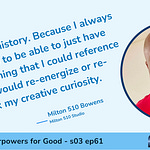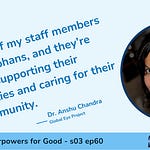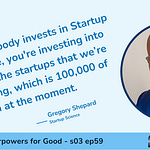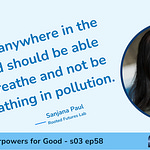This week, I’m hosting SuperCrowd22, so will only share one podcast. We’ll be back to two next week.
Devin: Tell us what you see as your superpower.
Corinna: I could say that my superpower essentially comes from my roots. I have been closely connected to food my whole life, and I look at connection as one of my most valued assets. I see the connection between things in my past, but also just the people that I’ve encountered along the way and the power of that connection to direct me on a path in my future.
Building a carbon-neutral economy ultimately requires that everything that we can produce in a carbon-reducing or regenerative manner must be. So, I was intrigued by Örlö Nutrition’s work, led by Corinna Bellizzi, to make supplements that help sequester carbon.
“I’m a greenie at heart and have spent the better part of my adult life in some form of activism,” Corinna says.
Fish oils are popular supplements, providing a healthy source of omega-3 fatty acids, which our bodies need but can’t produce from other raw materials.
There is, however, a fundamental problem with fish oil. “If every single person on the planet was taking an omega-3 supplement, there wouldn’t be enough fish in the sea,” Corinna says.
There is evidence that humans are already taking too much from the ocean. Corinna shared a specific example of the problems we see today:
You have the Peru anchovy, which is one of the largest anchovy and sardine fisheries in the entire planet. They're on the Humboldt Current, which is this cold upwelling of water that's very nutrient dense. All these fish are there, which is where then all the dolphin want to go to feed and the whales and everything else.
What you'll find is that in some of these areas like that, that local fisherman who aren't these giant trawling vessels, they start to look at the dolphins even as competition for the fish that they're trying to get out of the ocean.
So, you have these situations where these individuals are taking the law into their own hands in a way, and massacring these mammals that aren't even used. They're ultimately killing them because they look at them as competition, not for food, but because they look at them as competition.
This example ignores the carbon intensity of fishing and processing oils from fish into supplements that Örlö Nutrition strives to address. “When you grow algae photosynthetically, you’re drawing down carbon into the algae itself,” Corinna says.
The company produces its omega-3 fatty acids from algae grown in Iceland using 100 percent renewable energy. “Using technology and only green energy, we’re able to optimize its growth cycle and double its weight every two days,” she says.
“Because we’re doing it indoors in a controlled environment, we don’t have to use things like pesticides, herbicides, fungicides,” she adds.
“We’re taking waste stream CO2 from a green energy power plant, feeding it to the algae, bubbling it through the system,” Corinna says. “Those little bubbles of that carbon dioxide essentially act like scrubbing bubbles inside our equipment. And so it keeps everything also clean.”
She says the product has health advantages over fish oil as well. “Because it’s from algae that is grown in this way, we minimally process it, and it retains its polar lipid structure. This means that it’s three times more absorbable than a fish oil. So taking two small pills is equivalent to taking two very large pills of a fish oil.”
Corinna attributes her success to her superpower, her ability to make connections.
How to Develop Your Ability to Make Connections As a Superpower
Corinna says that passion is a factor in leveraging the power of connections. “There is this kind of unconscious guidance that I feel is ever present when you’re on a path where you feel like your passion is guiding your pursuit.”
She describes herself as “a little hippie kid who became an anthropologist and then decided to go into sales and marketing and natural products.” She recently completed a mid-career MBA at Santa Clara University.
She describes some of the new connections she made while earning her master’s degree:
I lean back on that power of connection. I still see things relatively the same way. I do think that there are some challenges in our capitalistic way of building societies where we've stacked the cards in a way against the little guys trying to do things right.
I think reform might be needed, but perhaps that will also come with the power of connection and really coming into contact with people in a deep and meaningful way, having meaningful conversations, caring about the things that I'm doing in my day to day, and then bringing them forward with intention.
Corinna shared a story to illustrate the power of connection.
When I went on a particular sales stretch with one of my broker representatives and into the territory of Florida, and we went into six or seven different accounts throughout the day, starting with a training in a little health food store and then meeting with a Whole Foods and a regional buyer and kind of going into all of these different situations.
What he said at the end of that day was that, Wow, Corina, I just saw five different entire approaches to these conversations. You changed with the people you were connecting with.
He didn't necessarily put it in exactly those words, but that's me leaning back and describing it. It wasn't that I was being disingenuous in any of those situations. It was that I was actively listening and thinking about who I was talking to and what they needed.
To help emulate her ability to make connections, I asked for some advice for our audience. She started with a bit of humor to make a point. “One of my business partners would probably say I’d ask them to fall in love with their customers.”
Asking thoughtful questions and listening to the answers is a tactic that may look like falling in love to some. “There’s something about this innate curiosity that I have about who they are or why they are, what they’re doing, what motivates them that I think needs to be nurtured,” she says.
Corinna expanded on this idea, saying:
You don't have to sit there and find out what they had for breakfast, but it might not hurt to know. Maybe they like chocolate or they're passionate about running marathons. It doesn't take much to just get to know them a little bit outside of that, that transaction, so to speak. So we move away from this entire kind of transactive approach to our relationships and into something deeper.
By following Corinna’s example and counsel, you make deeper connections that will help you develop a new superpower and do more good in the world.













